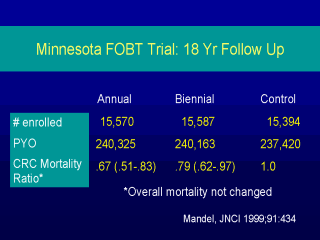 |
I think the landmark study in
this country was the Minnesota trial. They took 45,000 subjects and randomized them to
either annual or biannual fecal occult blood test, or usual care. What they found in the
annual FOBT is a 33% reduction in mortality to colorectal cancer. Interestingly, overall
mortality was not changed, but people did not die of colon cancer to the same degree.
There are complexities to this trial; they used a way of increasing the sensitivity so
they had a lot more false positives. There were a number of other studies done in Europe
and the overall effect is probably somewhere between 15-20% reduction in mortality done in
the usual fashion. This is maybe the best evidence thatís out there to show that taking
out polyps can subsequently reduce incidents of colorectal cancer. This is an 18 year
follow-up, so itís a long time out from when they started the trial, but they finally
are now starting to see a drop in incidents of cancer in the group that underwent
screening and surveillance. So thatís somewhat of a support to the idea that we go out
and search for polyps and remove these precursor lesions because subsequently we may
actually prevent the development of the cancer. |
